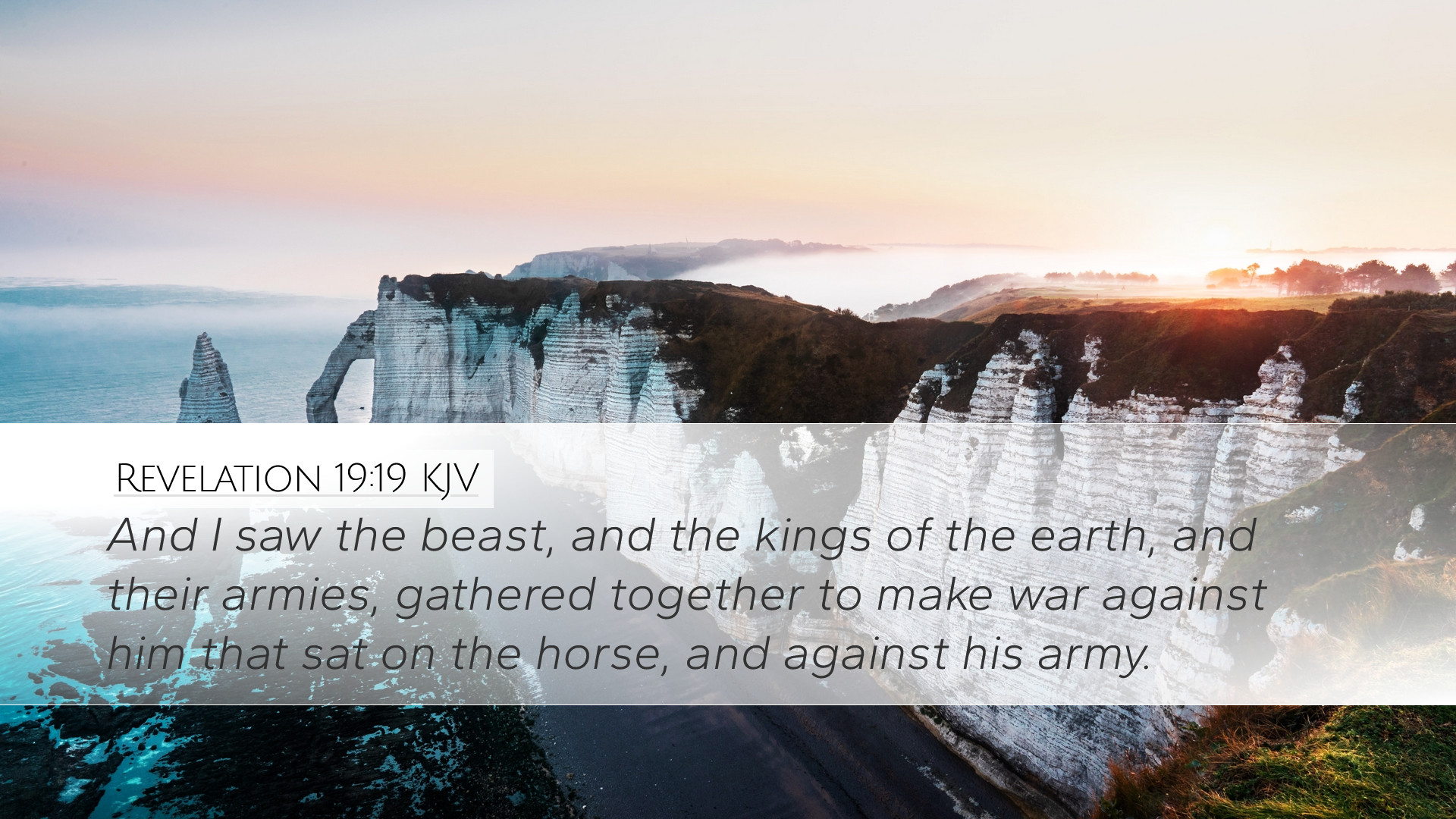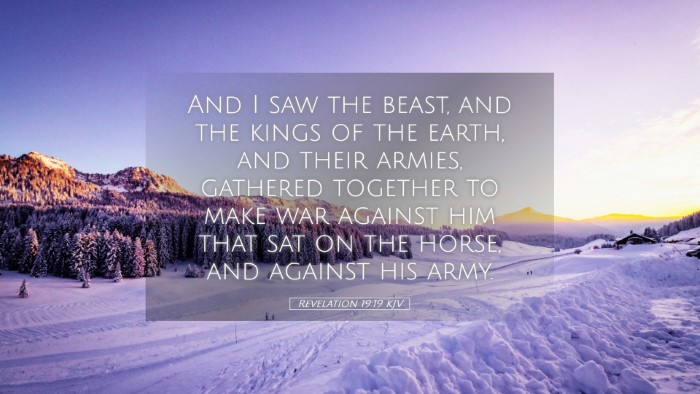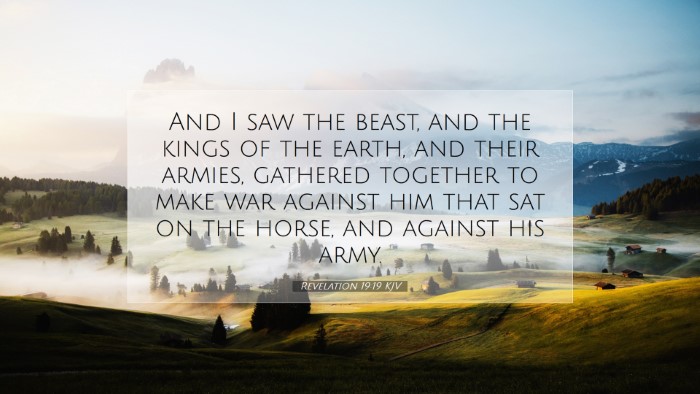Commentary on Revelation 19:19
Verse Reference: Revelation 19:19 (KJV) - "And I saw the beast, and the kings of the earth, and their armies, gathered together to make war against him that sat on the horse, and against his army."
Introduction
The scene depicted in Revelation 19:19 captures a climactic confrontation between divine authority and earthly rebellion. This verse serves as a pivotal moment in the eschatological narrative of the Book of Revelation, encapsulating the tension between the powers of darkness represented by the beast and the ultimate victory of Christ, the rider on the white horse. Various public domain commentaries shed light on the theological, historical, and prophetic implications of this passage.
The Beast and the Kings of the Earth
Contextual Analysis: The 'beast' symbolizes the antichrist forces in opposition to God. This imagery is deeply rooted in apocalyptic literature, representing a culmination of human defiance against divine authority.
- Matthew Henry: Henry emphasizes the beast’s role as a representation of the last earthly power that seeks to oppose God’s eternal kingdom. He notes that the gathering of kings reflects a coalition of worldly leaders united against Christ, which illustrates the climax of rebellion.
- Albert Barnes: Barnes expands on the multitude of kings compromising with the beast, depicting the moral decay of leadership during the end times. He argues that this signifies the ultimate failure of earthly powers to confront the sovereign rule of Christ.
- Adam Clarke: Clarke adds that this coalition illustrates humanity's desire to assert control in defiance of divine order, shedding light on the nature of spiritual warfare that believers face throughout history.
The Imagery of War
Symbolism of Conflict: The gathering described in this verse is not merely a physical confrontation but embodies a profound spiritual battle. The war signifies the ultimate conflict between good and evil, light and darkness.
- Matthew Henry: He highlights that the war conducted by the beast and his armies is ultimately futile, as they stand against the most powerful force in existence—Christ and His heavenly army. This serves as a reminder to believers about the transient nature of worldly power.
- Albert Barnes: Barnes explains that the war is symbolic of the final triumph of Christ over all adversaries. It underscores the importance of remaining steadfast in faith in the face of opposition.
- Adam Clarke: Clarke reflects on the intense imagery of the confrontation, positing that this war illustrates the finality of divine judgment and acts as an exhortation for believers to remain vigilant.
Understanding 'Him that Sat on the Horse'
Christ’s Authority: The figure of the rider on the white horse represents Jesus Christ, symbolizing purity, victory, and divine authority.
- Matthew Henry: Henry notes the significance of the rider being depicted as conquering and bringing judgment. This portrayal emphasizes Christ's role not merely as a savior but also as a righteous judge who brings justice to the earth.
- Albert Barnes: Barnes broadens the view, interpreting the rider as the embodiment of God's word, illustrating how Christ's sovereignty stands firm against opposition.
- Adam Clarke: Clarke emphasizes the divine nature of the rider, suggesting that His presence serves as both a comfort and a challenge to humanity as the ultimate arbiter of justice is revealed.
The Heavenly Army
The Followers of Christ: The passage also mentions 'his army,' referring to the multitude of believers and heavenly hosts that accompany Christ.
- Matthew Henry: Henry remarks on the assurance this army provides believers that they are not alone in spiritual battles, each member commissioned to share in the triumph of Christ.
- Albert Barnes: Barnes notes that this heavenly army symbolizes the victorious church, encouraging believers to persevere knowing they are part of a larger, divine purpose.
- Adam Clarke: Clarke highlights the significance of being part of this army, indicating a call to holiness and readiness for the final battle against evil.
Theological Reflections
Implications of the Passage: Revelation 19:19 raises critical theological themes relevant for contemporary believers, pastors, and scholars alike.
- God's Sovereignty: The verse reaffirms God's ultimate control over history and the assurance that evil will be vanquished.
- Call to Perseverance: Recognizing the futility of rebellion underscores the importance of faithfulness amidst trials and tribulations.
- Hope for Believers: The imagery of Christ and his army offers comfort and assurance of victory, promising that believers will share in His triumph over darkness.
Conclusion
The account in Revelation 19:19 is a powerful reminder of the spiritual realities that undergird our existence. The combined insights from Matthew Henry, Albert Barnes, and Adam Clarke provide a rich tapestry of understanding that encourages one to reflect on the nature of spiritual warfare, the sovereignty of Christ, and the hope inherent in being part of His eternal kingdom. As one contemplates this passage, it serves as both a warning against earthly rebellion and a source of encouragement to remain steadfast in the faith, assured of the eventual triumph of good over evil.


